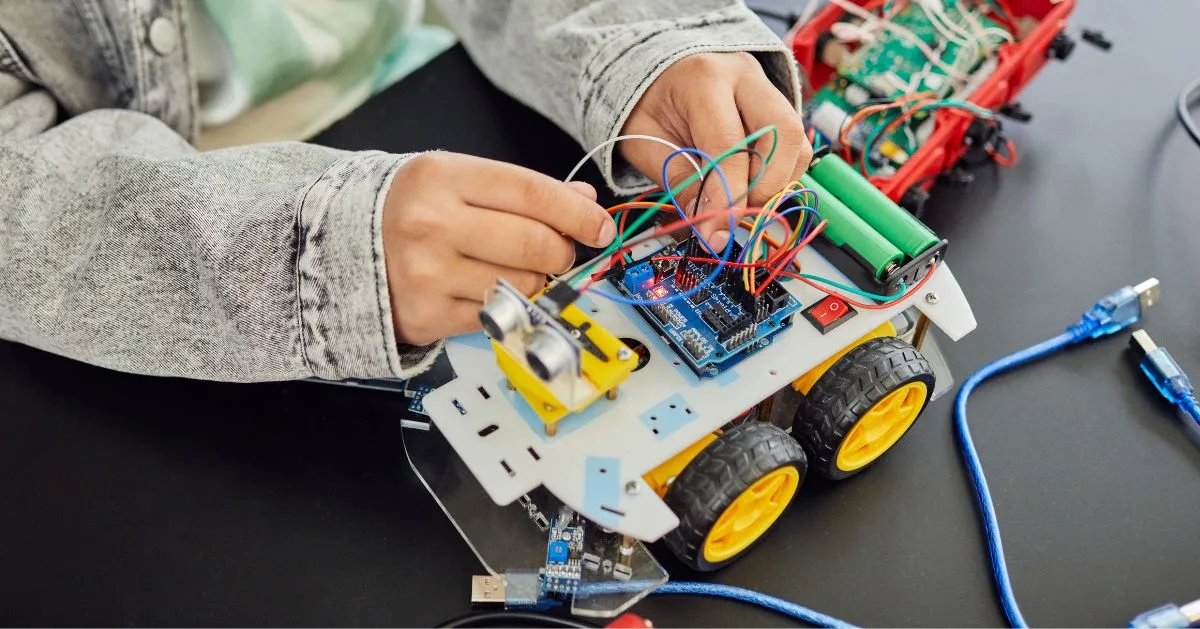Arduino is an open-source tool for electronics that has swept the world of do-it-yourself electronics and engineering. Arduino has made it easier for people who are new to electronics, programming, and mechanical systems to learn from a large group of makers, students, and experts. The Arduino platform is easy to use and flexible, so you can use it to make projects that teach useful engineering skills, like designing a robot or making a system that waters plants automatically.
This article will talk about some of the most fun and interesting do-it-yourself Arduino projects that will not only help you learn by doing but also teach you important engineering concepts. Let’s learn more about Arduino and how these projects can help you get better at engineering in the real world.
Why Arduino projects are great for learning how to be an engineer?
Arduino projects are a great way for people who are new to tech to start learning. They let students get real-world practice with many areas of engineering, like code, electronics, and mechanical systems. You can learn about many areas of engineering while making real-world systems that work with Arduino projects.
Arduino is great for beginners because it has an Integrated Development Environment (IDE) that is easy to use and a computer language that is simple to understand. Arduino can be used for both simple projects, like a simple temperature, and complicated systems, like robot arms or tools that do things for you. Arduino projects are a great way to start learning about engineering, whether you’re interested in robots, electronics, or home control.
Finally, let us look at some fun and interesting Arduino projects that teach basic engineering ideas.
1. System that water plants automatically
The automatic plant watering system is a great project for people who want to start learning about control systems, robotics, and sensing. With a soil moisture sensor, you can find out how wet the soil is and set off a water pump immediately when it’s needed.
You will learn how to connect a soil moisture sensor to an Arduino board, set up systems to run automatically based on the weather, and write simple programs to handle water pumps and switches through this project.
- What You Need: an Arduino board
- Sensor for soil wetness
- Module for relay
- Pump and pipes for water
- A body of water
2. Lighting system for smart homes
With an Arduino-based smart home lighting system, you can use your phone or a voice aid to control your lights from afar. This project is great for people who want to become engineers because it mixes user interface design, electrical systems, and radio communication.
It teaches you how to use Bluetooth or Wi-Fi modules to control devices wirelessly, how to safely use electrical wires to control lights with switches, and how to make an app or interface that people can use.
- What You Need: an Arduino board
- Module for relay
- Bluetooth and Wi-Fi module
- Mobile phone or voice helper
3. A digital thermometer with an LCD screen
One of the easiest and most useful things you can make with Arduino is a digital thermometer with an LCD screen. Using a DHT11 or LM35 temperature sensor, this project will teach you how to read data from the sensor and show it on a screen.
This project teaches you how to connect sensors, program to collect data, and show the results. It’s a good project for people who are new to DIY projects and Arduino.
- What You Need: an Arduino board
- Sensor for temperature (DHT11/LM35)
- LCD screen
- A circuit and wires
4. A simple way to keep your home safe
Using Arduino to make a home security system can be a great way to learn about sensors, security, and tracking in real time. You can set up a system that lets you know about possible attackers by combining motion sensors, door sensors, and sounds.
This project teaches you about tracking in real time, making systems that respond right away to inputs, and putting together alert systems that use communication systems like GSM.
- What You Need: an Arduino board
- PIR sensor for motion
- Sensor for magnetic doors
- Alarm or buzzer
- Module for GSM for alerts
5. Robot That Can Avoid Obstacles
A well-known Arduino project that teaches mechanical systems and robotics is the obstacle avoidance robot. You can make a robot that moves on its own and avoids barriers by using ultrasonic sensors, motors, and a motor driver.
You will learn about robots, motor control, and how to use sensors in this project. You will learn how to make systems that can use monitor data to make decisions in real time.
- What You Need: an Arduino board
- Sonar sensor (HC-SR04)
- DC motors and a head for them
- Wheels and the chassis
- Wire jumpers
6. A weather station based on Arduino
Using Arduino to build a weather station is a fun project that includes collecting data from many devices, such as air pressure, temperature, and humidity. With this project, you can learn how to collect data and keep an eye on the surroundings.
This project shows you how to use devices to gather information about the surroundings, use Arduino to process that information, and then show or save that information for later study. If you want to send the info online, it also adds cloud interaction.
- What You Need: an Arduino board
- Sensor for temperature and humidity (DHT11)
- Sensor for barometric pressure (BMP180)
- For cloud connectivity, use an LCD screen or a Wi-Fi module
